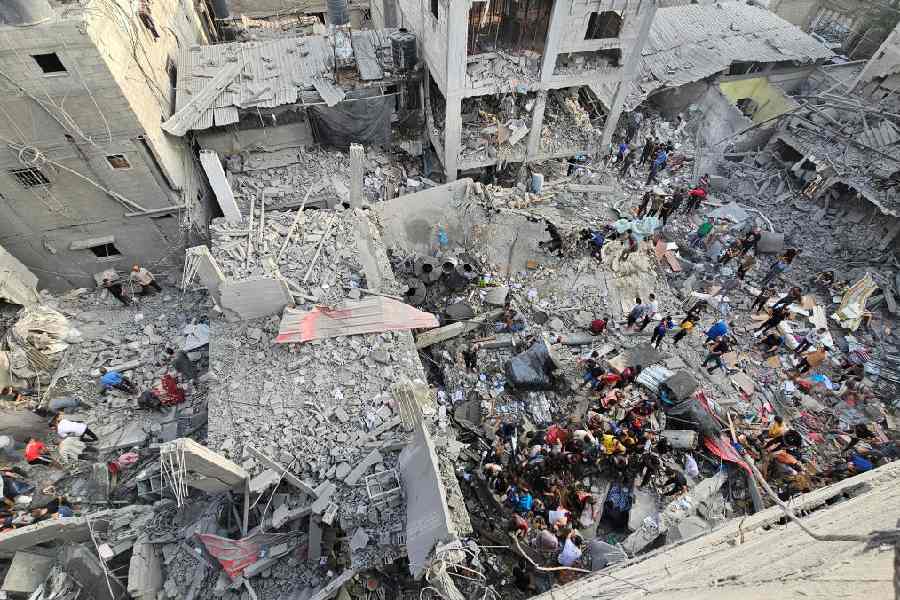Palestinians reported a deadly Israeli strike on a Gaza City area school serving as a shelter on Saturday, as US Secretary of State Antony Blinken was due to hear Arab demands for a ceasefire in a meeting in Jordan.
Witnesses said an Israeli strike hit Al-Fakhoura school in Jabalia refugee camp, killing and wounding many of the evacuees who had taken shelter there. At least 15 people died and dozens more were wounded, Mohammad Abu Selmeyah, the head of al-Shifa Hospital, said of the school incident.
Reuters pictures of the aftermath showed broken furniture and other belongings lying on the ground, patches of blood and people crying.
"People were preparing breakfast, when suddenly bombing started. I found my two girls, one of them was martyred and her head was hit, the second was wounded in her leg... the other girl as well was wounded with shrapnel," one man said in video footage obtained by Reuters.
The ministry of health in Gaza said another Israeli missile strike killed two women at the door of the Nasser Children Hospital. Several more people were injured, it said.
The Israeli military had no immediate comment on either reported strike and Reuters was not immediately able to verify any more details.
Hours earlier, Gaza health officials had said 15 people were killed in an Israeli air strike on an ambulance on Friday evening that was part of a convoy carrying injured Palestinians at Gaza's biggest hospital, al-Shifa.
Israel's military said it had identified and hit an ambulance "being used by an Hamas terrorist cell" and that a number of Hamas fighters were killed.
The Palestinian health ministry challenged Israel to provide proof that the ambulance was carrying militants. Israel said it intended to release additional information.
Israel's ground forces encircled Gaza City on Thursday after stepping up a bombing campaign it says aims at wiping out Hamas, after the militant group killed 1,400 people and took more than 240 hostage in an Oct. 7 assault in southern Israel.
Israel last month ordered all civilians to leave the northern part of the Gaza Strip, including Gaza City, and head to the south of the enclave, which it has also continued to bomb.
Israel has accused Hamas of hiding among civilians throughout the enclave and concealing command centres and tunnel entrances in al-Shifa, something Hamas and the hospital denies.
Gaza's living conditions, already dire before the fighting, have deteriorated further. Food is scarce, residents have resorted to drinking salty water, medical services are collapsing and Gaza health officials say more than 9,250 Palestinians have been killed.
Israel's military began widespread ground operations a week ago and in its latest update it said a combined tank and combat engineering unit carried out a "pinpoint raid" in the southern Gaza Strip "to map out buildings and neutralise explosives".
The U.N. humanitarian office OCHA estimates that nearly 1.5 million of Gaza's 2.3 million people are internally displaced.
Lebanon's caretaker Prime Minister Najib Mikati emphasized the urgency of a ceasefire in Gaza when he met Blinken in Amman on Saturday, Lebanon state news agency said.
Blinken, in turn, emphasized his efforts to halt military operations for humanitarian reasons and to address the issue of prisoners.
On Saturday Blinken is also due to meet the Saudi, Qatari, Emirati and Egyptian foreign ministers, as well as Palestinian representatives in Amman, the Jordanian foreign ministry said.
The Arab leaders will stress the "Arab stance calling for an immediate ceasefire, delivering humanitarian aid and ways of ending the dangerous deterioration that threatens the security of the region", the ministry said in a statement.
Washington has maintained robust military and political support for Israel, while calling on its ally to take steps to avoid civilian deaths and address Gaza's humanitarian crisis.
Israel says no pause unless hostages are freed
Hamas has prepared for a protracted war in Gaza and believes it can hold up Israel's advance long enough to force its arch enemy to agree to a ceasefire, two sources close to the organization's leadership said.
The group is also seeking a tangible concession, such as the release of Palestinian prisoners in exchange for Israeli hostages, the sources said.
Hamas official Izzat El Reshiq on Saturday urged Arab leaders and people to pressure Israel and the US administration by cutting diplomatic ties, expelling ambassadors and leveraging oil and economic interests to support the people in the Gaza Strip.
Blinken met with Israeli Prime Minister Benjamin Netanyahu on Friday and called for a humanitarian pause in fighting that he said would facilitate work to release hostages, allow aid into Gaza but not prevent Israel from defending itself.
In a televised address, Netanyahu rejected the idea of a pause unless hostages were freed.
A senior Biden administration official said on Friday the US had "indirect engagement" aimed at freeing the hostages.
Explaining why it was taking "so long" to get foreign nationals out, the official said Hamas initially conditioned the release of foreigners on wounded Palestinians being able to exit as well, but one-third of the Palestinians on the list turned out to be Hamas members.
While Blinken was in Israel, the leader of Lebanon's Iran-backed Hezbollah group warned the United States that if Israel did not stop its assault on Gaza, the conflict could widen into a regional war.
Sayyed Hassan Nasrallah, in his first speech since the Israel-Hamas conflict erupted, also threatened the US, hinting his paramilitary group was ready to confront American warships in the Mediterranean.
A heavily armed ally of Hamas, Hezbollah has been engaging Israeli forces on the Lebanon-Israel border in the biggest flare-up since it fought a war with Israel in 2006.
Other Iran-aligned groups have entered the fray since Oct. 7, with Iran-backed Shi'ite groups firing on US forces in Iraq and Syria, and Yemen's Houthis launching drones at Israel.











